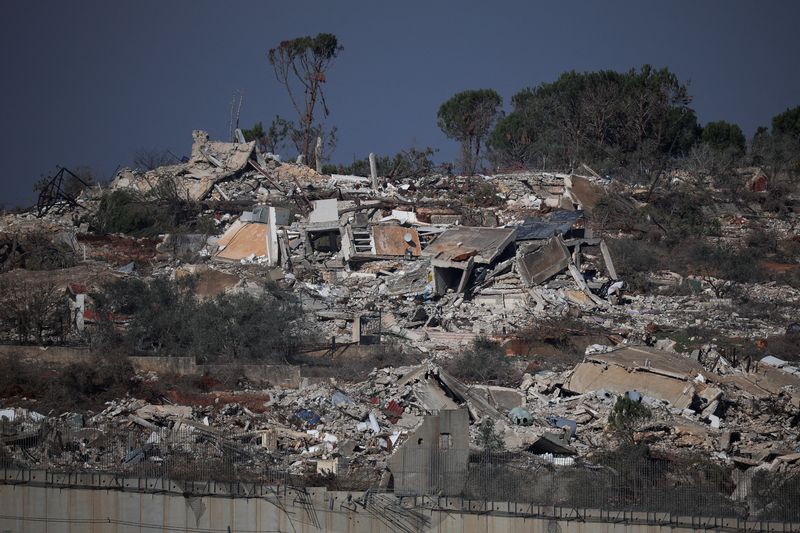By Laila Bassam, Maya Gebeily and Steven Scheer
BEIRUT/JERUSALEM (Reuters) -Israel threatened on Tuesday to return to war in Lebanon if its truce with Hezbollah collapses, and said this time its attacks would go deeper and target the Lebanese state itself, after the deadliest day since the ceasefire was agreed last week.
In its strongest threat since the truce was agreed to end 14 months of war with Hezbollah, Israel said it would hold Lebanon responsible for failing to disarm militants who violate the ceasefire.
"If we return to war we will act strongly, we will go deeper, and the most important thing they need to know: that there will be no longer be an exemption for the state of Lebanon," Defence Minister Israel Katz said.
"If until now we separated the state of Lebanon from Hezbollah... it will no longer be [like this]," he said during a visit to the northern border area.
Despite last week's truce, Israeli forces have continued strikes against what they say are Hezbollah fighters ignoring the agreement to halt attacks and withdraw beyond the Litani River, about 30 km (18 miles) from the frontier.
On Monday, Hezbollah shelled an Israeli military post, while Lebanese authorities said at least 12 people were killed in Israeli airstrikes on Lebanon. Another person was killed on Tuesday by a drone strike, Lebanon said.
Israeli Prime Minister Benjamin Netanyahu said any infraction of the truce would be punished, however small.
"We are enforcing this ceasefire with an iron fist," he said ahead of a cabinet meeting in the northern border city of Nahariya. "We are currently in a ceasefire, I note, a ceasefire, not the end of the war," he added.
DIPLOMACY
Top Lebanese officials urged Washington and Paris to press Israel to uphold the ceasefire, after dozens of military operations on Lebanese soil that Beirut has deemed violations, two senior Lebanese political sources told Reuters on Tuesday.
The sources said caretaker Prime Minister Najib Mikati and Speaker of Parliament Nabih Berri, a close Hezbollah ally who negotiated the deal on behalf of Lebanon, spoke to officials at the White House and French presidency late on Monday.
Mikati, quoted by the Lebanese news agency, said that diplomatic communications had intensified since Monday to stop Israeli violations of the ceasefire. He also said a recruitment drive was under way by the Lebanese army to strengthen its presence in the south.
U.S. State Department spokesperson Matt Miller told reporters on Monday that the ceasefire "is holding" and that the U.S. had "anticipated that there might be violations".
The truce came into effect on Nov. 27 and prohibits Israel from conducting offensive military operations in Lebanon, while requiring Lebanon to prevent armed groups including Hezbollah from launching attacks on Israel. It gives Israeli troops 60 days to withdraw from south Lebanon.
A mission chaired by the United States is tasked with monitoring, verifying and helping enforce the truce, but it has yet to begin work.
Lebanon's Mikati met in Beirut on Monday with U.S. General Jasper Jeffers, who will chair the monitoring committee.

Two sources familiar with the matter told Reuters that France's representative to the committee, General Guillaume Ponchin, would arrive in Beirut on Wednesday and that the committee would hold its first meeting on Thursday.
"There is an urgency to finalise the mechanism, otherwise it will be too late," one of the sources said, referring to Israel's gradual intensification of strikes despite the truce.